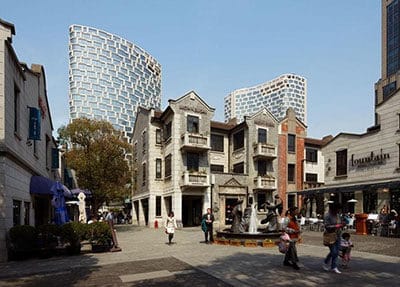
Shui On Chairman Vincent Lo is seeking a lighter touch over the company’s investments
Hong Kong-listed developer Shui On Land has announced that it is partnering with two insurance giants to invest in commercial real estate ventures in China as it continues to lean on financial services companies to rebuild its mainland portfolio.
The joint venture deal with state-owned China Life Insurance and Canadian multinational Manulife Financial is worth an estimated $1 billion, according to a statement Shui On made to the Hong Kong Stock Exchange, and follows on the heels of similar deals Shui On has reached over the past several years with China Life and other insurers.
While it maintains a listing on the Toronto stock exchange, Manulife, like Shui On and China Life also trades on the Hong Kong stock exchange. Neither Manulife nor China Life made stock market announcements regarding the agreement.
Corporate Ave 5 Will Seed Fund
Shui On, made famous through its downtown Xintiandi project in Shanghai, will contribute $200 million to the fund, Manulife $450 million, and China Life $100 million, with Shui On retaining the right to add additional investors.
As the inaugural acquisition for the joint venture, China Life is selling Corporate Avenue 5 in Shanghai to the new platform for an undisclosed amount, although Shui On indicated that $150 million from that transaction will in turn being used to seed the fund through a separate joint venture company.
China Life had purchased Corporate Avenue 5 from Shui On in 2013 for a cash consideration of RMB 3.32 billion for the 27-storey prime office property in Shanghai’s Huangpu district.
According to the Savills research, Corporate Avenue 5, which has just under 79,000 square metres of above ground GFA is close to full occupancy, with its 51,623 square metres of prime office space achieving estimated effective rents of roughly RMB 10.50 to RMB 11.00 per square metre per day. The property also has 27,035 square metres of retail space and occupies a footprint of 11,817 square metres. The total GFA of the property, including below ground space is over 102,000 square metres.
Shui On said in its HKEX announcement that the partnership would target investments mainly in Shanghai and other Tier 1 cities in China, with a Shui On subsidiary, Shui On Manager, responsible for coordinating management and administration of any properties held under the joint venture, including Corporate Avenue 5.
Asset-Light, Profit-Steady?

Shui On is still looking for a success story as great as Xintiandi in Shanghai.
The deal comes at a crucial time for the developer, which is controlled by Chairman Vincent Lo and has seen its leverage ratio climb while it tries to gain traction from its current portfolio. By pursuing new projects with the help of outside funding, Shui On is hoping to return to a more profitable model of business, as it had its flagship Xintiandi project had helped to redefine the centre of Shanghai.
Xintiandi, considered to be China’s first “lifestyle center” and urban entertainment/residential district, was completed in 2002 and quickly became home for both China’s upwardly mobile elite and expat executives.
Building on the success of Xintiandi, Shui On struggled to replicate its success in its Wuhan Tiandi, Chongqing Tiandi and other projects in China’s emerging cities, while rising costs of relocation and helped it to pile on debt.
In May last year Shui On sold Chongqing Tiandi to China Vanke for RMB 4.1 billion and then in May of this year the company sold its Dalian Tiandi project in Liaoning province to local developer Yida China for RMB 4.65 billion.
Working with Insurers to Get Back in the Game
Since July of this year, Shui On has shown signs of being on the mend as it teamed with a pair of mainland companies to win a RMB 13.6 billion tender for a 78,256 square metre prime commercial site near Shanghai’s Huaihai Lu.
For that development project, Shui On also teamed up with an insurer, taking a 25 percent in the JV as against a 70 percent holding for Shanghai-based China Pacific Insurance and five percent for developer Shanghai Yongye Group.
In a separate announcement last week to the Hong Kong Exchange, Shui On said it was acquiring the nearly 22 percent stake that it does not already own in China Xintiandi Holding Company from BSREP CXTD, for a total consideration of HK$4,073,780,000, with CXTD becoming a wholly owned subsidiary of Shui On. Shui On had attempted to spin off China Xintiandi Holding in 2015 with the reported goal of achieving an IPO, although the plan never came to fruition.
Restoring Its Balance Sheet
In one of its most recent major attempts to help return some health to its balance sheet, Shui On in October 2017 agreed to sell a 49 percent stake in one of its landmark Shanghai properties — the mixed-used, 400,000-square-metre Knowledge and Innovation Community, or KIC — for RMB 2.95 billion (about $443 million) to a unit of China Life. That amount added to project and share disposals by Shui On that had amounted to nearly RMB 42 billion dating back to 2013. Shui On retained a 51 percent stake in the KIC properties, which it had completed building in 2015.
Much like it did in its statement to the HKEX last week announcing its new joint venture partnership, Shui On said of the KIC deal at the time that it was looking to “leverage its commercial brands and asset management expertise in order to grow its portfolio and recurring income base.”
Lo has been pursuing an “asset light” strategy for Shui On since at least 2015, when the company turned its focus to higher-return opportunities, but has been offloading properties since its Corporate Avenue 5 disposal in 2013. The largest sale was its disposal of another part of the Corporate Avenue family — Corporate Avenue 1 and 2 — to Hong Kong’s Link REIT for RMB 6.6 billion in 2015.
It also reportedly sold off a 50 percent stake in its Ruichong Xincheng development in Shanghai in March 2017 for RMB 8 billion, and in May 2017 disposed of a nearly 80 percent stake in its Chongqing Tiandi complex to China Vanke for RMB 4.1 billion.
Will this lift Shui On share values up out of the sewer?